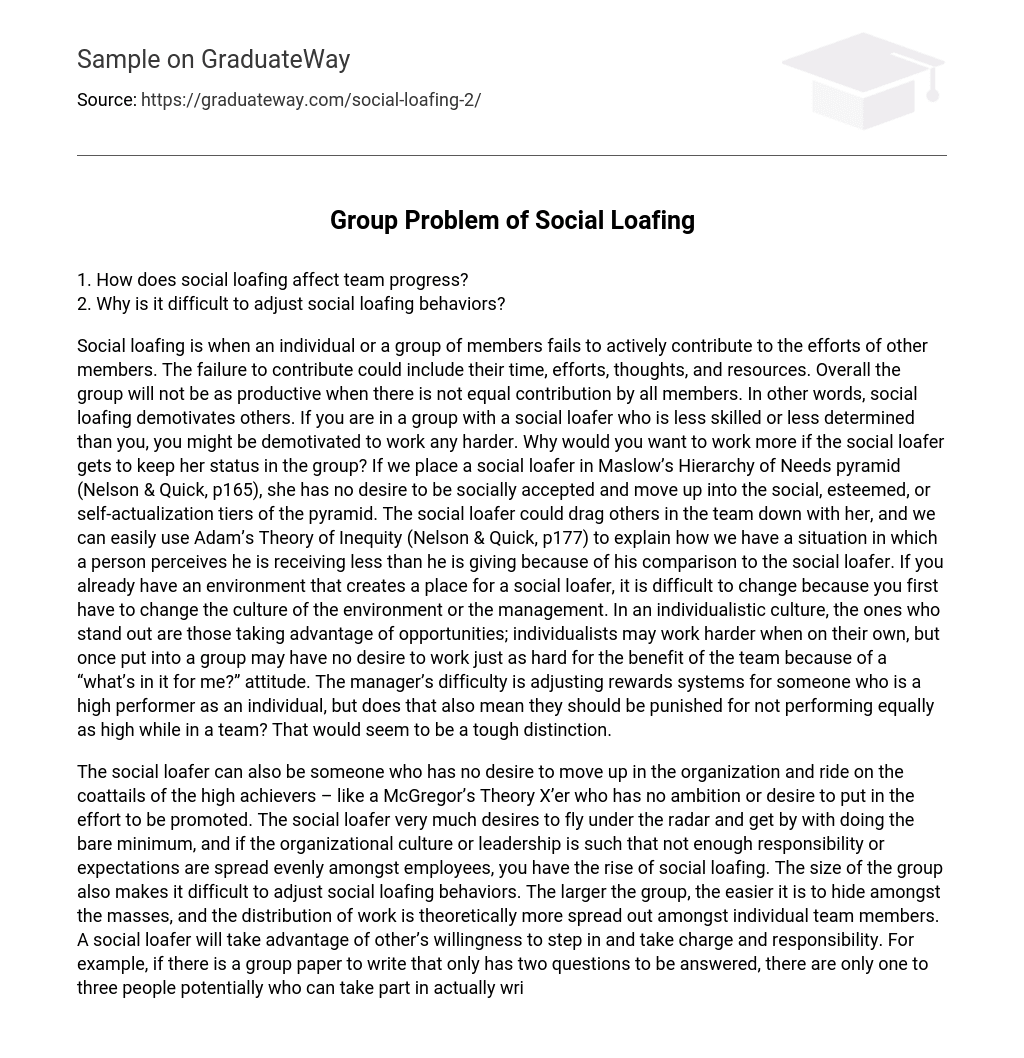1. How does social loafing affect team progress?
2. Why is it difficult to adjust social loafing behaviors?
Social loafing is when an individual or a group of members fails to actively contribute to the efforts of other members. The failure to contribute could include their time, efforts, thoughts, and resources. Overall the group will not be as productive when there is not equal contribution by all members. In other words, social loafing demotivates others. If you are in a group with a social loafer who is less skilled or less determined than you, you might be demotivated to work any harder. Why would you want to work more if the social loafer gets to keep her status in the group? If we place a social loafer in Maslow’s Hierarchy of Needs pyramid (Nelson & Quick, p165), she has no desire to be socially accepted and move up into the social, esteemed, or self-actualization tiers of the pyramid. The social loafer could drag others in the team down with her, and we can easily use Adam’s Theory of Inequity (Nelson & Quick, p177) to explain how we have a situation in which a person perceives he is receiving less than he is giving because of his comparison to the social loafer. If you already have an environment that creates a place for a social loafer, it is difficult to change because you first have to change the culture of the environment or the management. In an individualistic culture, the ones who stand out are those taking advantage of opportunities; individualists may work harder when on their own, but once put into a group may have no desire to work just as hard for the benefit of the team because of a “what’s in it for me?” attitude. The manager’s difficulty is adjusting rewards systems for someone who is a high performer as an individual, but does that also mean they should be punished for not performing equally as high while in a team? That would seem to be a tough distinction.
The social loafer can also be someone who has no desire to move up in the organization and ride on the coattails of the high achievers – like a McGregor’s Theory X’er who has no ambition or desire to put in the effort to be promoted. The social loafer very much desires to fly under the radar and get by with doing the bare minimum, and if the organizational culture or leadership is such that not enough responsibility or expectations are spread evenly amongst employees, you have the rise of social loafing. The size of the group also makes it difficult to adjust social loafing behaviors. The larger the group, the easier it is to hide amongst the masses, and the distribution of work is theoretically more spread out amongst individual team members. A social loafer will take advantage of other’s willingness to step in and take charge and responsibility. For example, if there is a group paper to write that only has two questions to be answered, there are only one to three people potentially who can take part in actually writing the paper. Amongst a group of ten team members, there is bound to be someone without a task, assuming you have a group discussion, one person to type up each question, and then a proof reader. You could argue that the people actually formulating and writing down the responses are working harder. The social loafer can easily not participate by either, 1) relying on the other 9 people to give their opinions, or 2) not participating in the writing or editing. Even with a strong leader to delegate in the group, there are only so many people who are able to participate because of the limited availability of tasks. For managers, a social loafer on your team can cost a lot of diverted time and energy to changing the behavior of one individual.
A manager may be able to use operant conditioning (Nelson & Quick, p199) to deliver punishment to change the behavior. Perhaps in the case above, the loafer could be asked to work longer hours to make up for the effort put in by her teammates, but that wouldn’t necessarily benefit the group if the loafer’s skills and motivations are lacking. The work still needs to be done and done well. However, when all is said and done, the definition of social loafing is the failure of a group member to contribute personal time, effort, thoughts, or other resources to the group (Nelson & Quick, p739). One could easily argue that the simplest solution would be to fire a social loafer, but it is more complex than that, especially if the social loafer is a high performer as an individual. The larger problem could be the organizational culture, management style, reward/punishment systems in place – many other factors that are equally difficult to adjust.





